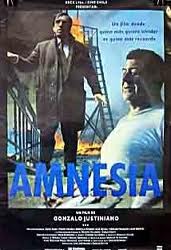
AMNESIA
Chile, 1994, 90 minutes, Colour.
Julio Jung, Pedro Vicuna.
Directed by Gonzalo Justiniano
Amnesia is a strong Chilean feature, made in the '90s, but urging especially Latin-American? audiences to remember the oppression of the previous quarter of a century.
The film is an attempt to awaken people in the southern American continent from their amnesia.
The film focuses on a soldier who had been a prisoner decades earlier in the Chilean desert. By chance he encounters one of the officers at the camp who had been particularly cruel. As he stalks him and gets to know him, he plans vengeance. But, at the end, he wonders whether murdering his persecutor will resolve anything. The film received an ecumenical award at the 1995 Berlin Film Festival.
1. Impact of the film? For Latin-American? audiences? World-wide? The universality of its message?
2. The city settings, the desert? The re-creation of the war? The music, the wide-ranging songs and their being sung throughout the film?
3. The title, the amnesia of the '80s and '90s? The film's explanation of Chilean amnesia?
4. Ramirez, ordinary citizen, his relationship with his wife, the encounter with Zuniga? The anniversary, at the market, the garlic, the search, paying? Getting information? Claiming to be an old friend?
5. The meeting, the sharing, Zuniga's uncertainty? The drink, the restaurant, the talk?
6. The interspersing of the conversation with memories? The contrast of past and present? The revelation of each character? The effect on Ramirez? The revelation? The revelation to Zuniga?
7. The prison in the desert, the vastness of the desert, the loneliness, the outpost and isolation, the young and the ignorant soldiers? Obeying orders?
8. The political prisoners, the men and the women, age and background? The pregnant woman? Their work, the revolution? The soldiers and orders to kill? The shooting? The outpost, the writing and the philosophy? The final deaths?
9. The soldiers and the command? The commanding officer and his growing desperation? The phone calls to higher authorities? Zuniga and his place in the camp, taking over, cruelty?
10. Zuniga and his military background, orders, killing? Niggling about who should be killed or not? The pregnant woman, the takeover?
11. Ramirez and his unwillingness to shoot, burying the dead, encountering the survivor, the camp, the pregnant woman, the charge, leaving?
12. The survivors? The phone call, the wife, the bus? The confrontation? The accident, hanging and shooting?
13. Ramirez and his motives? Disgust and revenge? The passing of time, his change of character? Zuniga and the passing of time? The past cruelty, the same man in the comfortable surroundings of the city?
14. The build-up to the meal, the decision not to kill Zuniga? Zuniga and his fear? The rekindling of memories as sufficient revenge?